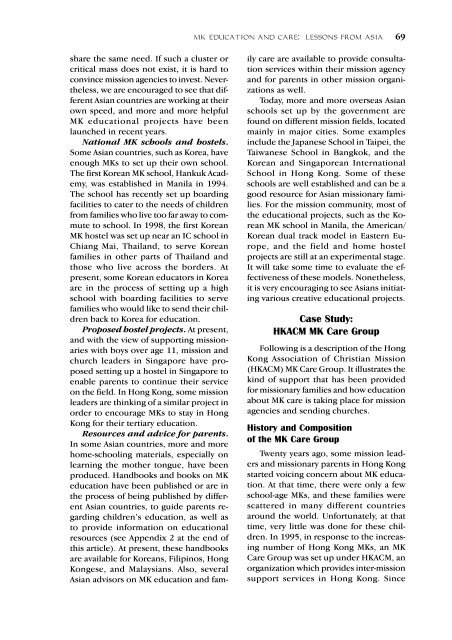Part 2 Regional Issues and Insights - World Evangelical Alliance
Part 2 Regional Issues and Insights - World Evangelical Alliance
Part 2 Regional Issues and Insights - World Evangelical Alliance
Create successful ePaper yourself
Turn your PDF publications into a flip-book with our unique Google optimized e-Paper software.
mk education <strong>and</strong> care: lessons from asia 69<br />
share the same need. If such a cluster or<br />
critical mass does not exist, it is hard to<br />
convince mission agencies to invest. Nevertheless,<br />
we are encouraged to see that different<br />
Asian countries are working at their<br />
own speed, <strong>and</strong> more <strong>and</strong> more helpful<br />
MK educational projects have been<br />
launched in recent years.<br />
National MK schools <strong>and</strong> hostels.<br />
Some Asian countries, such as Korea, have<br />
enough MKs to set up their own school.<br />
The first Korean MK school, Hankuk Academy,<br />
was established in Manila in 1994.<br />
The school has recently set up boarding<br />
facilities to cater to the needs of children<br />
from families who live too far away to commute<br />
to school. In 1998, the first Korean<br />
MK hostel was set up near an IC school in<br />
Chiang Mai, Thail<strong>and</strong>, to serve Korean<br />
families in other parts of Thail<strong>and</strong> <strong>and</strong><br />
those who live across the borders. At<br />
present, some Korean educators in Korea<br />
are in the process of setting up a high<br />
school with boarding facilities to serve<br />
families who would like to send their children<br />
back to Korea for education.<br />
Proposed hostel projects. At present,<br />
<strong>and</strong> with the view of supporting missionaries<br />
with boys over age 11, mission <strong>and</strong><br />
church leaders in Singapore have proposed<br />
setting up a hostel in Singapore to<br />
enable parents to continue their service<br />
on the field. In Hong Kong, some mission<br />
leaders are thinking of a similar project in<br />
order to encourage MKs to stay in Hong<br />
Kong for their tertiary education.<br />
Resources <strong>and</strong> advice for parents.<br />
In some Asian countries, more <strong>and</strong> more<br />
home-schooling materials, especially on<br />
learning the mother tongue, have been<br />
produced. H<strong>and</strong>books <strong>and</strong> books on MK<br />
education have been published or are in<br />
the process of being published by different<br />
Asian countries, to guide parents regarding<br />
children’s education, as well as<br />
to provide information on educational<br />
resources (see Appendix 2 at the end of<br />
this article). At present, these h<strong>and</strong>books<br />
are available for Koreans, Filipinos, Hong<br />
Kongese, <strong>and</strong> Malaysians. Also, several<br />
Asian advisors on MK education <strong>and</strong> family<br />
care are available to provide consultation<br />
services within their mission agency<br />
<strong>and</strong> for parents in other mission organizations<br />
as well.<br />
Today, more <strong>and</strong> more overseas Asian<br />
schools set up by the government are<br />
found on different mission fields, located<br />
mainly in major cities. Some examples<br />
include the Japanese School in Taipei, the<br />
Taiwanese School in Bangkok, <strong>and</strong> the<br />
Korean <strong>and</strong> Singaporean International<br />
School in Hong Kong. Some of these<br />
schools are well established <strong>and</strong> can be a<br />
good resource for Asian missionary families.<br />
For the mission community, most of<br />
the educational projects, such as the Korean<br />
MK school in Manila, the American/<br />
Korean dual track model in Eastern Europe,<br />
<strong>and</strong> the field <strong>and</strong> home hostel<br />
projects are still at an experimental stage.<br />
It will take some time to evaluate the effectiveness<br />
of these models. Nonetheless,<br />
it is very encouraging to see Asians initiating<br />
various creative educational projects.<br />
Case Study:<br />
HKACM MK Care Group<br />
Following is a description of the Hong<br />
Kong Association of Christian Mission<br />
(HKACM) MK Care Group. It illustrates the<br />
kind of support that has been provided<br />
for missionary families <strong>and</strong> how education<br />
about MK care is taking place for mission<br />
agencies <strong>and</strong> sending churches.<br />
History <strong>and</strong> Composition<br />
of the MK Care Group<br />
Twenty years ago, some mission leaders<br />
<strong>and</strong> missionary parents in Hong Kong<br />
started voicing concern about MK education.<br />
At that time, there were only a few<br />
school-age MKs, <strong>and</strong> these families were<br />
scattered in many different countries<br />
around the world. Unfortunately, at that<br />
time, very little was done for these children.<br />
In 1995, in response to the increasing<br />
number of Hong Kong MKs, an MK<br />
Care Group was set up under HKACM, an<br />
organization which provides inter-mission<br />
support services in Hong Kong. Since
















